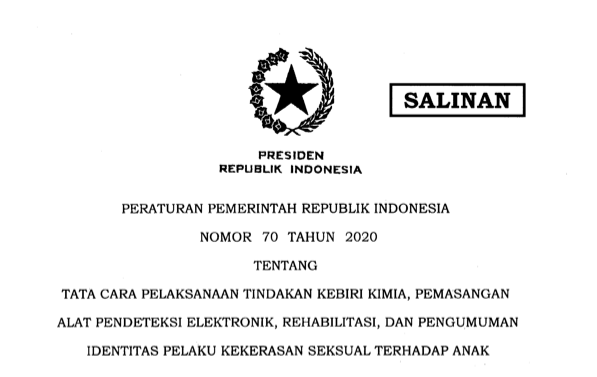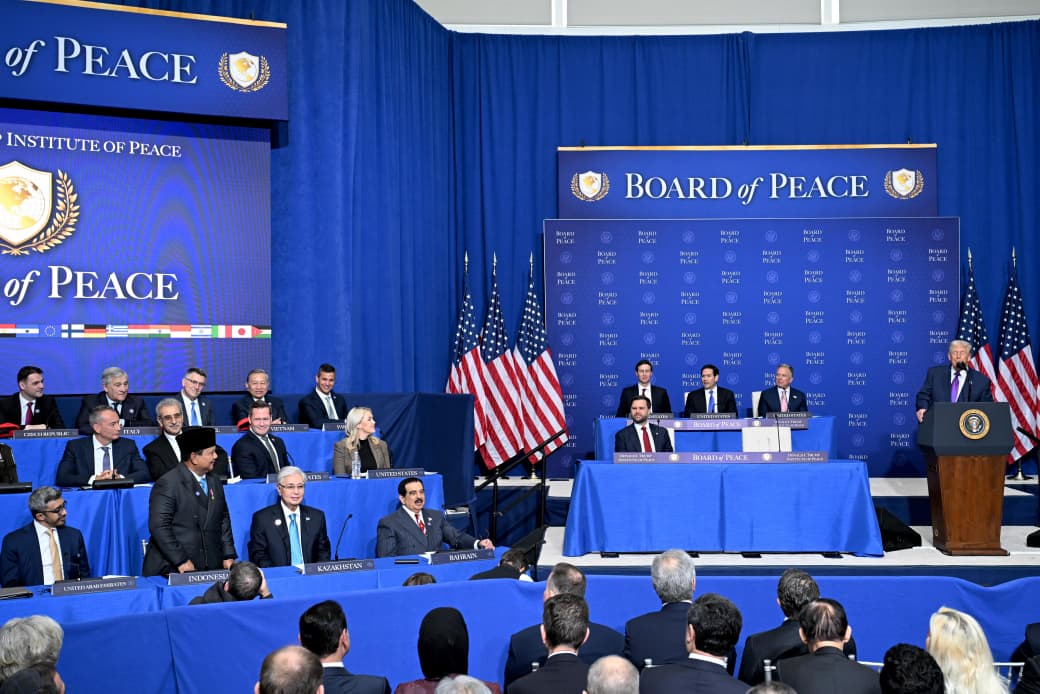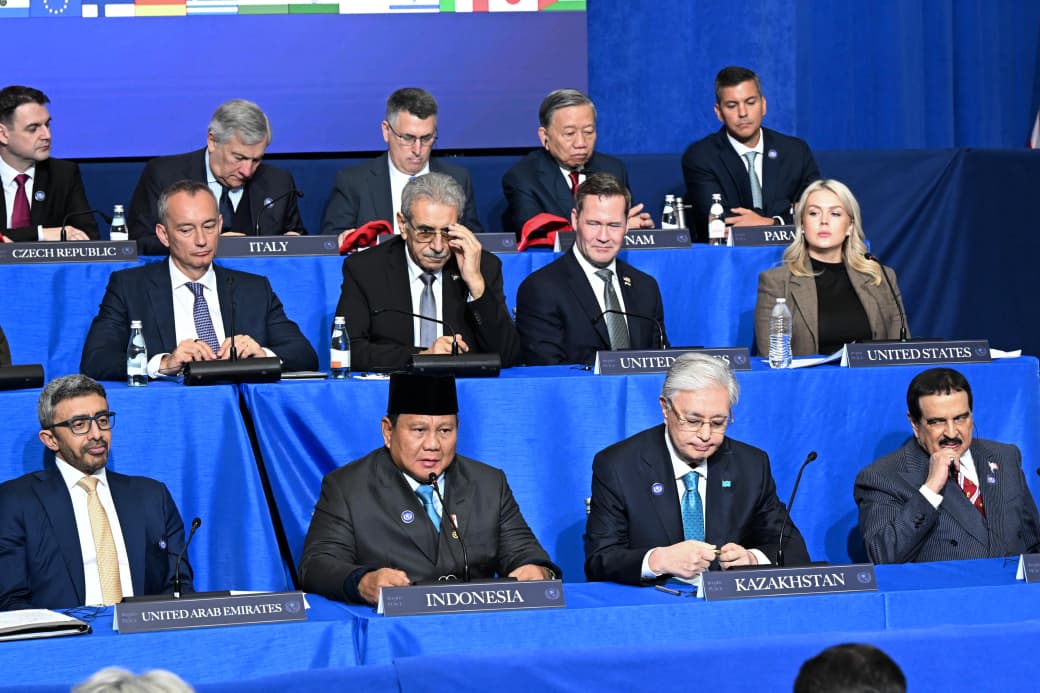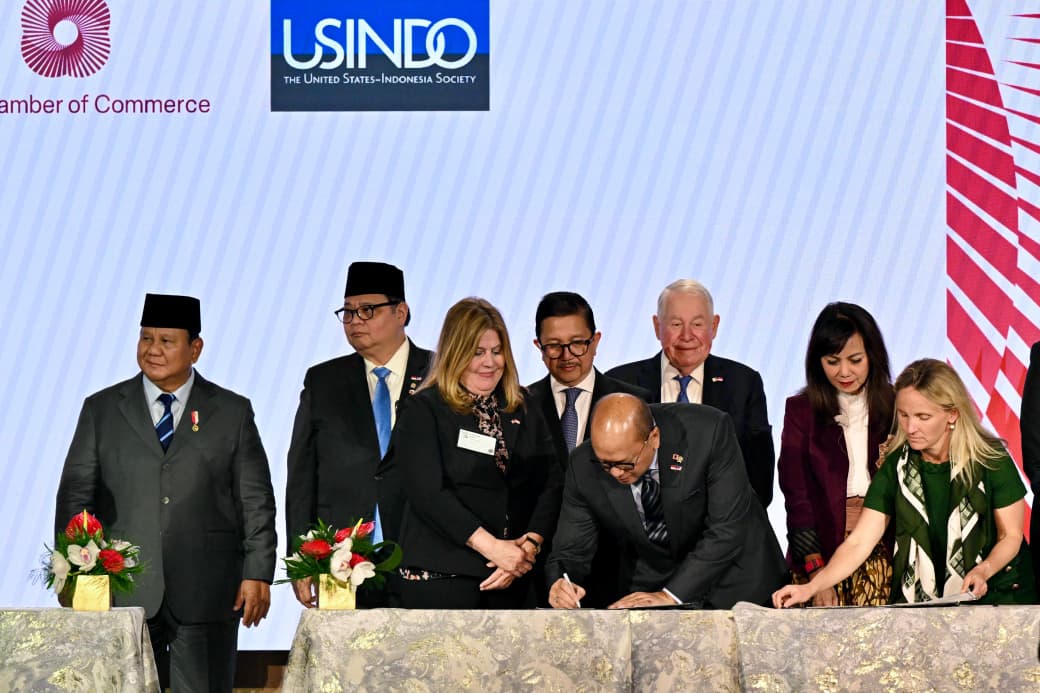Gov’t Issues Regulation on Chemical Castration for Perpetrators of Child Sexual Violence

The Government has issued Government Regulation Number 70 of 2020 on Procedures for the Implementation of Chemical Castration, Installation of Electronic Detection Devices, Rehabilitation, and Announcement of the Identity of Perpetrators of Sexual Violence against Children.
The Regulation, signed by President Joko “Jokowi” Widodo on 7 December 2020, aims to address sexual violence against children, provide a deterrent effect on perpetrators, and prevent sexual violence against children.
The Regulation, which can be accessed on jdih.setkab.go.id, also aims to implement provisions of Law Number 17 of 2016 on the Approval of Government Regulations in Lieu of Law Number 1 of 2016 on the Second Amendment to Law Number 23 of 2002 on Child Protection.
“The perpetrator of sexual violence against children is a perpetrator of criminal acts of intercourse with a child with violence or threats of sexual violence in forcing the child to have intercourse with the perpetrator or with other people, and perpetrator of criminal of obscene acts against a child with violence or threats of sexual violence, forcing or deceiving children, committing a series of lies, or persuading a child to commit or allow an obscene act to be committed ” the Regulation states.
The Regulation defines a child as a person under the age of 18, including an unborn child.
Chemical castration, installing of electronic detection devices and rehabilitation are imposed on the perpetrators of sexual intercourse. Meanwhile, perpetrators of obscene acts are subject to the installation of electronic detection devices and rehabilitation.
The sanctions are imposed based on a court decision that has final and binding legal force and is made by competent officials at the behest of the prosecutor.
“The implementation of the court rulings shall be carried out by order of the prosecutor after coordinating with the Ministry that administers the Government affairs in the health sector, the Ministry that administers the Government affairs in the legal sector, and the Ministry that administers the Government affairs in the social sector,” Article 2 paragraph (3) of the Regulation reads.
Based on the provisions of Article 4 of the Regulation, child offenders cannot be subject to chemical castration and the installation of electronic detectors.
Chemical castration is applied for a maximum period of two years, and is carried out in three stages, namely clinical assessment, conclusion, and implementation. The castration is carried out by giving chemicals through injection or other methods to suppress excessive sexual desire, accompanied by rehabilitation.
“The clinical assessment includes clinical and psychiatric interviews; physical examination; and supporting examinations,” Article 7 paragraph (2) of the Regulation reads.
In the assessment procedure, the Ministry that administers the Government affairs in the legal sector submits a notification to the prosecutor not later than nine months before the convict finishes serving the basic sentence.
Within seven working days after the notification, the prosecutor delivers the notification and coordinates with the Ministry that administers the Government affairs in the health sector for clinical assessment.
Clinical assessment begins not later than seven working days from the receipt of the notification and the results will be delivered in the form of a conclusion to ensure that the perpetrator of intercourse is eligible or not for chemical castration.
The conclusion is submitted to the prosecutor not later than fourteen working days from the receipt of the notification from the prosecutor.
“The implementation of the chemical castration is carried out after the conclusion states that the perpetrator of sexual intercourse is eligible to be subjected to a chemical castration,” Article 9 letter a of the Regulation states.
Within a period of not later than seven working days from the receipt of the conclusion, the prosecutor orders the doctor to carry out a chemical castration. The action is carried out in a Government-owned hospital or a designated regional hospital.
Under Article 10 paragraph (1) of the Regulation, in the event that the conclusion states that the perpetrator is not eligible to be subjected to chemical castration, the castration will be postponed for a maximum of six months.
“During the postponement period, a re-clinical assessment and re-conclusion are carried out to ensure that the perpetrator is eligible or not for chemical castration,” Article 10 paragraph (2) states.
In the event that the assessment shows the perpetrator is not eligible, the prosecutor, in a written statement, will notify the court that decides the case at the first level by attaching the results of the re-clinical assessment and re-conclusion.
The installment of electronic detector is imposed on perpetrators of intercourse and obscene acts. The detector may be an electronic bracelet or something similar to it.
“The installment of an electronic detector to the perpetrator is for a maximum of 2 (two) years,” Article 14 paragraph (3) of the Regulation reads.
For the installation of electronic detection devices, the Ministry that administers the Government affairs in the legal sector submits notification letters to the prosecutor, the Ministry that administers the Government affairs in the health sector, and the Ministry that administers the Government affairs in the social sector not later than one month before the perpetrator of sexual violence against children finishes serving basic sentence.
The installment is carried out immediately after the perpetrator finishes serving the basic sentence. “The installation of an electronic detection device was carried out at the behest of the prosecutor by ordering the Ministry that administers the Government affairs in the legal sector to work hand in hand with the Ministry that administers the Government affairs in the social sector and the Ministry that administers the Government affairs in the health sector,” Article 16 letter e of the Regulation reads.
The removal of detection devices is also carried out by the same Ministries on the order of the prosecutor.
For the perpetrator of intercourse subjected to chemical castration, the rehabilitation is provided in the forms of psychiatric rehabilitation, social rehabilitation and medical rehabilitation and is started not later than three months after the implementation of the castration. Rehabilitation for the perpetrator of obscene acts is in the form of psychiatric rehabilitation and social rehabilitation.
“The Rehabilitation is carried out by order of the prosecutor in a coordinated, integrated, comprehensive and sustainable manner,” Article 18 paragraph (3) of the Regulation reads.
Based on the provisions in CHAPTER III on the announcement of the identity of the perpetrator of sexual violence against children, the Ministry that administers the Government affairs in the legal sector submits a notification letter to the prosecutor not later than fourteen working days before the perpetrator of sexual violence against children finishes serving the basic sentence.
The announcement will be made by the prosecutor not later than seven working days after the perpetrator finishes serving the basic sentence.
“The announcement of the identity of the perpetrator of sexual violence against children shall be made within 1 (one) calendar month through an announcement board; the prosecutor’s official website; print media, electronic media, and/or social media,” Article 21 paragraph (2) of the Regulation reads.
The announcement of the identity of the perpetrator contains not less than the name of the perpetrator; the latest picture; residence identification number/passport number; date of birth; gender; and the latest address/domicile.
The Regulation also stipulates that child offenders cannot be subject to additional punishment in the form of the identity announcement.
“The Government Regulation shall come into force as of the date of its promulgation,” Article 25 of the Government Regulation reads. The Regulation was promulgated by Minister of Law and Human Rights Yasonna Laoly on 7 December 2020. (UN) (RI/MUR)







